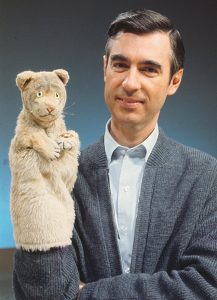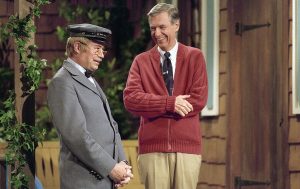![]() I’ll be honest… I never really watched Mister Rogers’ Neighborhood growing up. I’m not sure if it just didn’t happen to be on when I was in front of the television set, or if I simply had other interests… I do remember Sesame Street very well. Regardless, Fred Rogers made a huge impact on generations of children and the new documentary Won’t You Be My Neighbor? uses interviews and footage to tells the story of how this eccentric man influenced and helped kids cope with not only childhood, but the big, confusing world around them.
I’ll be honest… I never really watched Mister Rogers’ Neighborhood growing up. I’m not sure if it just didn’t happen to be on when I was in front of the television set, or if I simply had other interests… I do remember Sesame Street very well. Regardless, Fred Rogers made a huge impact on generations of children and the new documentary Won’t You Be My Neighbor? uses interviews and footage to tells the story of how this eccentric man influenced and helped kids cope with not only childhood, but the big, confusing world around them.
 It offers a considerable amount of interesting information about the man, although some of it may simply be enlightening to this reviewer because of a lack of knowledge in general. The film picks up with Rogers attempting to start his own children’s program in the 50s after watching other shows one day and being unimpressed with what he saw. Developing his talents as a writer, puppeteer and performer on an original series, he eventually graduated to creating his own show, Mister Rogers’ Neighborhood, more than a decade later in Pittsburgh, PA. Coworkers reminisce about the extremely low-budget nature of the program and suggest that the main reason for the show’s success was the star’s ability to connect with and relate to children.
It offers a considerable amount of interesting information about the man, although some of it may simply be enlightening to this reviewer because of a lack of knowledge in general. The film picks up with Rogers attempting to start his own children’s program in the 50s after watching other shows one day and being unimpressed with what he saw. Developing his talents as a writer, puppeteer and performer on an original series, he eventually graduated to creating his own show, Mister Rogers’ Neighborhood, more than a decade later in Pittsburgh, PA. Coworkers reminisce about the extremely low-budget nature of the program and suggest that the main reason for the show’s success was the star’s ability to connect with and relate to children.
As the film progresses, it helps give more detail as to what inspired the performer on a personal level and shows some of the remarkable accomplishments on what most considered a fairly tame kid’s show. Curiously, Rogers came from a strict upbringing, was overweight in childhood and something of an outcast. He had always intended to become a Presbyterian minister and his career blossomed while taking a break from seminary school.
 Yet, despite being deeply religious and conservative in many respects, he convinced President Nixon and the government not to cut funding to PBS. Rogers also insisted on dealing with social and political topics in his show, taking on subjects like grieving and death, segregation and self-esteem issues, as well as subjects like Robert Kennedy’s assassination. As viewers soon learn, his goal was to foster a spirit of love in order to bring people together, promoting understanding, tolerance and speaking frankly to kids about their concerns. It is surmised that some of the subjects are so effectively rendered because the performer could relate them to his own childhood fears and anxieties.
Yet, despite being deeply religious and conservative in many respects, he convinced President Nixon and the government not to cut funding to PBS. Rogers also insisted on dealing with social and political topics in his show, taking on subjects like grieving and death, segregation and self-esteem issues, as well as subjects like Robert Kennedy’s assassination. As viewers soon learn, his goal was to foster a spirit of love in order to bring people together, promoting understanding, tolerance and speaking frankly to kids about their concerns. It is surmised that some of the subjects are so effectively rendered because the performer could relate them to his own childhood fears and anxieties.
Certainly, this film is an ode to Fred Rogers, and so there isn’t much here that he could do wrong in the eyes of those interviewed. His naturally reserved nature also means that viewers will have to interpret stories and what they see to glean more about what was really going on inside the man’s head.
 Obviously, a reverential movie like this suffers slightly from having a lack of conflict on display, meaning that there isn’t much onscreen drama depicted. Rogers did make odd requests to cast members to keep specific aspects of their personal lives to themselves, but this minor conflict is resolved relatively quickly. The film also deals with a hint of disappointment and bitterness that Rogers felt towards the end of his life (not helped by the frequent attacks on him from his fellow conservatives), but this is about as much strife as is depicted.
Obviously, a reverential movie like this suffers slightly from having a lack of conflict on display, meaning that there isn’t much onscreen drama depicted. Rogers did make odd requests to cast members to keep specific aspects of their personal lives to themselves, but this minor conflict is resolved relatively quickly. The film also deals with a hint of disappointment and bitterness that Rogers felt towards the end of his life (not helped by the frequent attacks on him from his fellow conservatives), but this is about as much strife as is depicted.
Regardless, this is an interesting documentary that gave this reviewer much more insight into who Fred Rogers was and the remarkable accomplishments he achieved over his lifetime. Won’t You Be My Neighbor? is a sweet little film that should captivate and inform those who grew up watching Mr. Rogers on the television and perhaps as an adult, make them appreciate his accomplishments even more.


